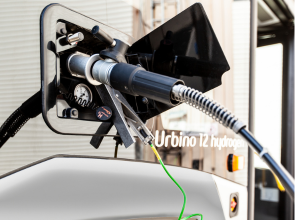Daimler Truck and Volvo plan for mass production of fuel-cell trucks
Only the combination of fuel cell and battery-electric trucks can provide the best genuinely CO2-neutral vehicle options.

Daimler Truck AG and Volvo Group today (29th April) have provided more details about their newly established fuel-cell joint venture, cellcentric, H2 Bulletin reports.
Cellcentric, which was established on 1 March 2021, will develop, produce and commercialise fuel-cell systems for long-haul trucking and other applications, employing decades of valuable experience of both companies. Over 300 experts work for cellcentric in Nabern, Stuttgart (Germany) and Burnaby (Canada). So far, about 700 individual patents have been issued.
The joint venture will build one of Europe’s largest planned series production of fuel-cell systems, with operations planned to begin 2025. As a significant step towards series production, preparations for pre-series production occur at a new site in Esslingen near Stuttgart, while it is also scaling up ongoing prototype output.
The goal is to start with customer tests of fuel-cell trucks in about three years, and to be in series production of fuel-cell trucks during the second half of this decade. All vehicle-related activities are carried out independently from each other, given that both companies are competitors in all vehicle and product ranges, including fuel-cell integration solutions for products.
The plan has been outlined in today digital launch led by Martin Daum, CEO of Daimler Truck AG, and Martin Lundstedt, CEO of Volvo Group. Both automakers aim to accelerate the use of hydrogen-based fuel cells for long-haul trucks to help meet the 2050 targets of sustainable transport and a carbon-neutral Europe.
Martin Daum, CEO of Daimler Truck AG, said, “Hydrogen-powered fuel-cell electric trucks will be key for enabling CO2-neutral transportation in the future.”
Martin Lundstedt, CEO of Volvo Group, says: “There needs to be greater cooperation between public and private stakeholders to develop the necessary technology and infrastructure, which is why we are calling for united action from policymakers and governments around the world in helping us make hydrogen fuel-cell technology a success.”
Currently, CO2-neutral trucks are substantially more expensive than conventional vehicles. Therefore, a policy framework must ensure demand and affordability, including incentives for CO2-neutral technologies, a taxation system based on carbon and energy content and an emissions trading system. It is expected that battery power will be used for lower cargo weights and shorter distances, while fuel-cell power will be used for heavier loads and longer distances.
However, both shareholders also urged for a harmonised EU hydrogen policy framework for the fuel cell technology to be commercially viable. Recently, the major truck manufacturers in Europe also called for around 300 high-performance hydrogen refuelling stations suitable for heavy-duty vehicles by 2025 and around 1,000 hydrogen refuelling stations by 2030 in Europe.
